Part 46: Europa Universalis III: Chapter 16 - To Live and Die by the Rhine: 1580 - 1600
1580 - 1600: To Live and Die by the Rhine
Swabia is at war with France over the province of Cologne in the Rheinland. The Imperial Army is mobilized and readied for war. Spies in Paris provide information on the French army, which reveals that the situation isn't quite as bleak as feared - France has expended much manpower on recent wars, and their army only outnumbers Swabia by about 25%.

The 1st Army, led by Friedrich himself, is sent towards Cologne to try and save it from the impending French attack.

The battle initially goes well, but when a second French army joins the first, Friedrich is forced to retreat, leaving Cologne to its fate.
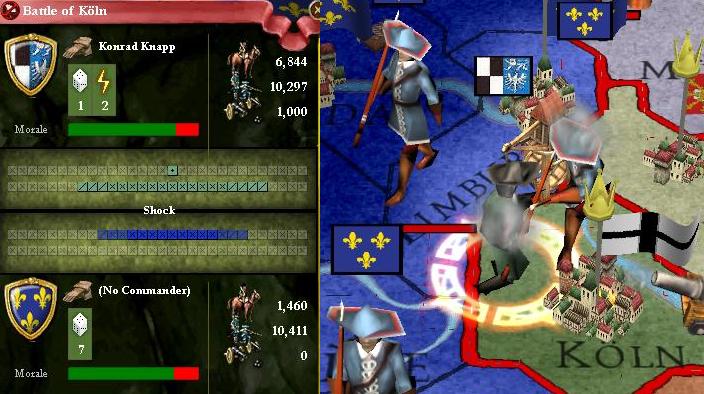
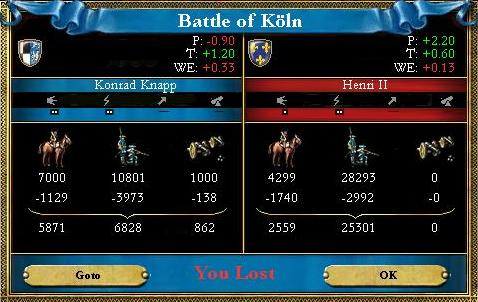
Cologne is taken by storm, and annexed to the French crown.
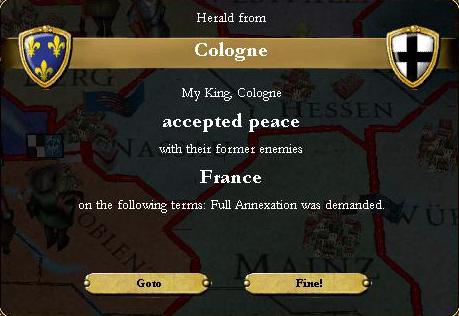
French troops advance across the border, defeating the 1st and 3rd Imperial armies, which withdraw deeper into Swabia.
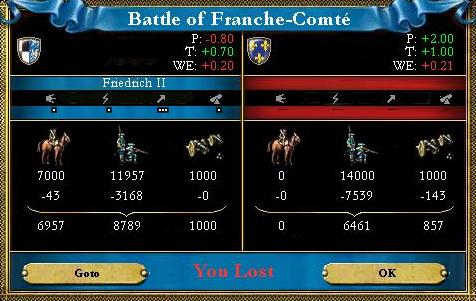
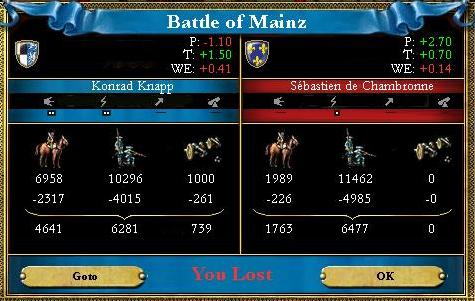
The 2nd and 4th armies, meanwhile, have been concentrating on the armies of France's allies Meissen and Hesse. Both nations' armed forces are defeated and run down by the Swabians, and they are quick to offer peace, leaving Swabia free to focus its full attention on France.
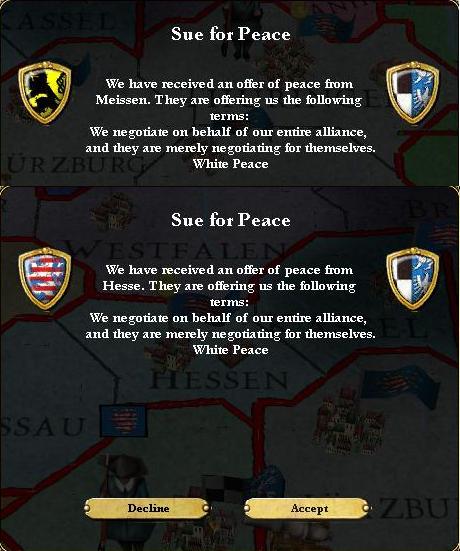
Friedrich begins a counter-offensive, driving the French back out of Swabia after several fierce battles with heavy losses on both sides. Three Imperial armies cross the border into France in October of 1580.
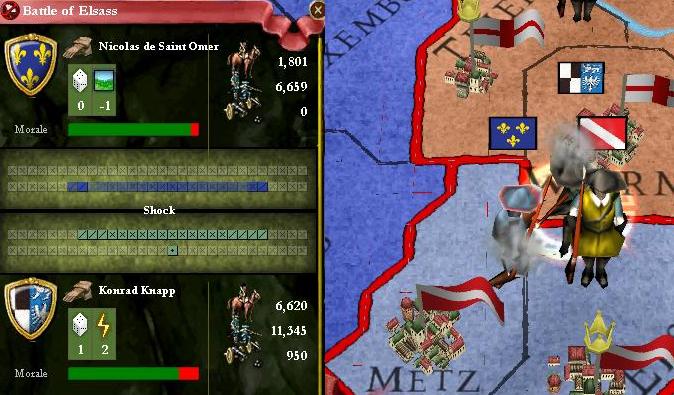

The French manpower shortfall is revealed to be worse than predicted, and after a number of costly clashes, most of their regiments are heavily understrength.

By April of 1581, several border territories are in Swabian hands.

A French blockade fleet tries to enter the Mediterranean in May, only to be faced with five Caravels from the Imperial Navy, which Friedrich had deployed to the Gulf of Alermia for just such an occasion. The French ships are sunk with no losses on the Swabian side.

The advance across France continues, the 1st and 2nd armies now having reached Flanders.
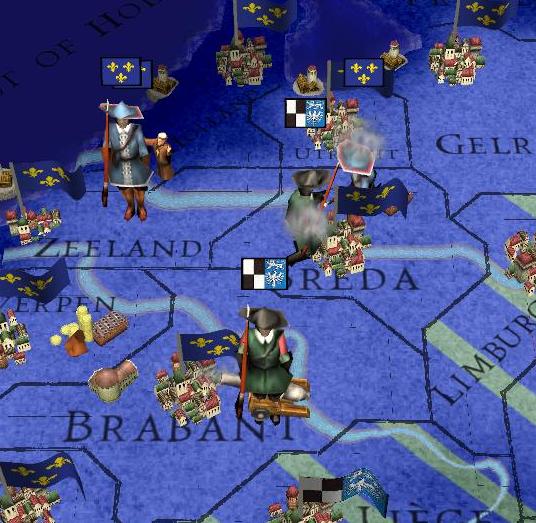
Further south, the 4th army is advancing on Paris itself. The French have little left in the fight, and their capital falls in July of 1582.
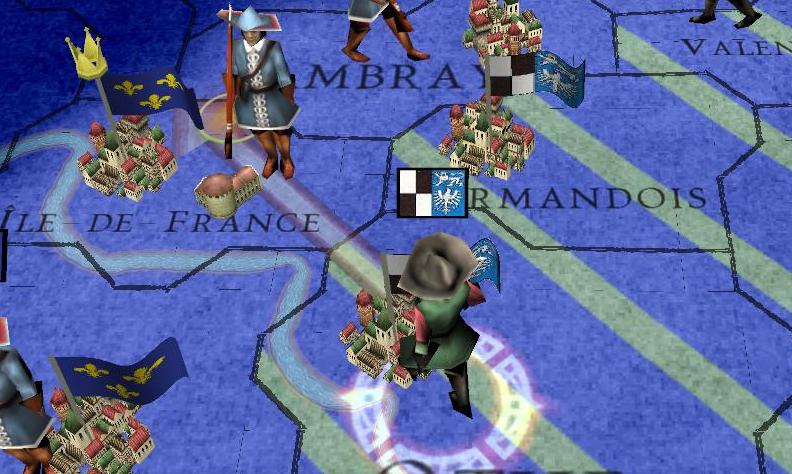

The war is a resounding victory for the Imperial Army. Henri II is forced to agree to a harsh peace, ceding both Cologne and Franche-Comté, which France gained from Alsace over a century ago. The victory is all the more celebrated for being so unexpected, but in reality it was an inevitable conclusion of Henri's foolish decision to go to war with practically no manpower reserves.

Rather than being given back its independence, Cologne is given to Cleves, which agrees to become a Swabian vassal in exchange for the doubling of its territory.
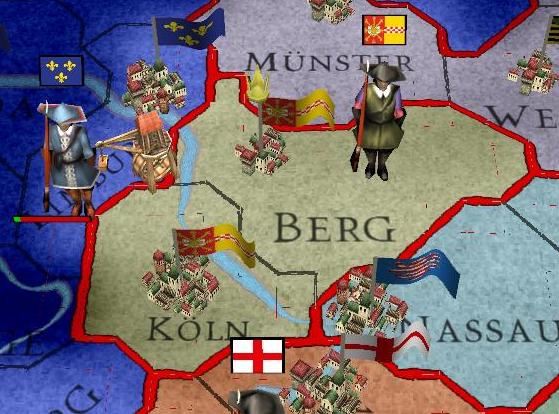
Peace settles in, and news continue to arrive at the court of Berber expeditions launched deep into the lands of the natives of the new world - a Berber seafarer by the name of Ibn Aksil is said to have conquered a native empire with only a few hundred troops, adding considerably to Iberia's holdings.
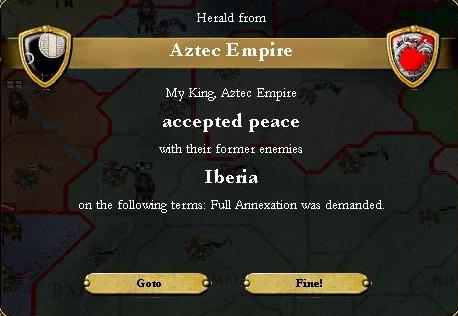
After so many years of being a Swabian vassal, Alsace's annexation in 1586 is almost painless, save for among the Cathari population in Lothringen.

The Electors are not amused, however, but Friedrich dismisses their protests out of hand.
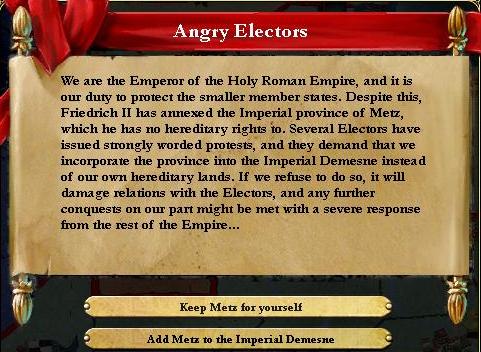
The revolts along the Iberian-French border come to an end in 1588 with Iberia's annexation of Free Aragon, Avignon having already been divided between Dauphine and France.

Verona remains apart from the Empire, a constant source of anti-Imperial rhetoric and publications that despite Friedrich's best efforts continue to circulate throughout his lands. He sees his chance to deal more handily with the problem when two events occur in 1589 - first, the Duke of Verona is excommunicated for allowing the publication of anti-Papal propaganda. Second, Verona loses its powerful protector Austria when the latter refuses to remain allied to an excommunicated ruler.
The time is ripe to strike, and Friedrich declares war in January of 1590. Sicily dishonours its alliance with Verona, refusing to go to war against Friedrich.
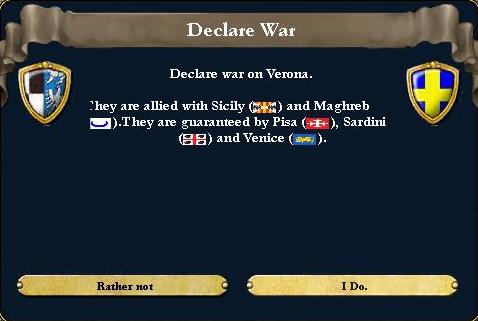
40,000 imperial troops enter Verona, wiping out its army and taking the city by storm. Verona is sacked, all printing houses are torched and their owners executed, and the province is annexed to Swabia.

Verona's allies Pisa, Venice, Sardinia and Maghreb remain in the war, and the Imperial Navy is deployed to blockade Pisa. Pisa's galley fleet makes a valiant sortie against the Swabian Caravels, but are defeated and sunk.
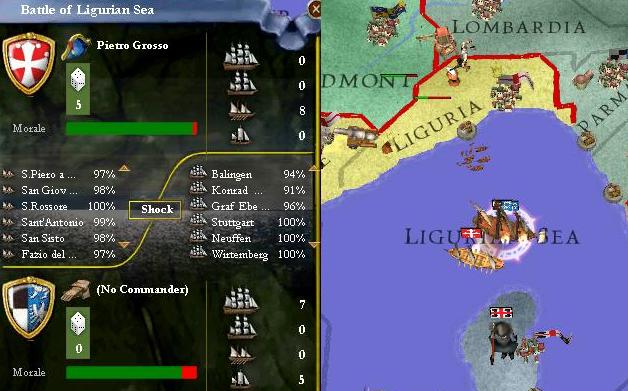
Just as Friedrich begins to plan his invasion of Pisa, his Chancellor cautiously advises him that Swabia is not seen with favourable eyes by the various great powers - his annexation of Verona may be understandable, though not approved of, but an invasion of Pisa would be seen as sheer unmotivated expanionism.
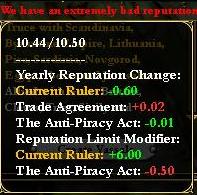
Deciding not to risk it, Friedrich settles for peace in exchange for a moderate tribute in April of 1590.
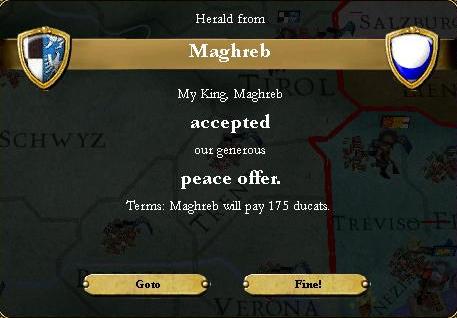
The peace is barely two months old when Henri II decides that he has endured the insult of his defeat quite long enough, declaring war on Swabia directly. It has been eight years since the last war, and France's armies and reserves have been almost fully replentished - Henri is not about to make the same mistake twice.
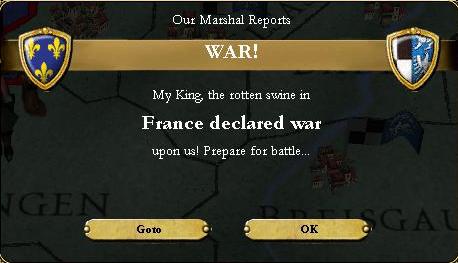

Most of Swabia's armies are still in Italy, and the French advance across the border relatively unopposed, defeating the 1st army in Franche-Comté and advancing into Switzerland.
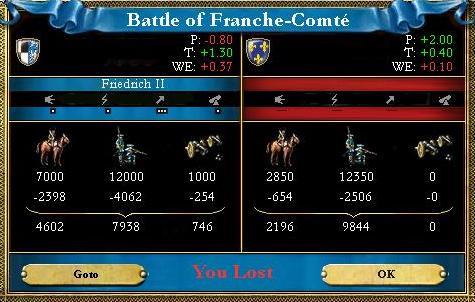
A massive battle takes place in Bern, as more than 30,000 troops on each side clash. Despite having the numbers, the Swabians are routed, retreating into Schwyz.

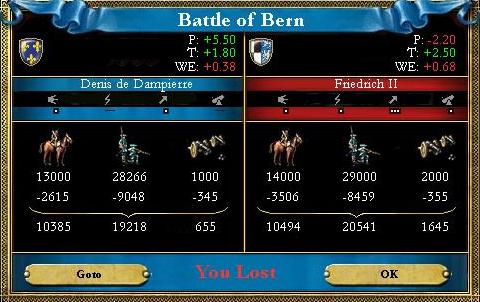
By January of 1591, most of the Swabian-French border is in the hands of the Frenchmen, and they have made gains into Cleves and Trier as well.
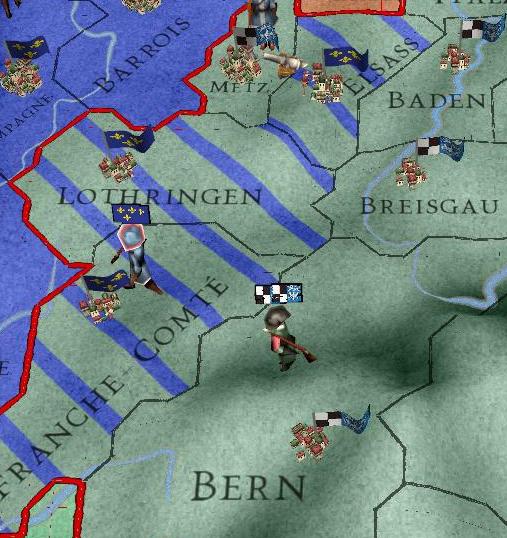
Cleves takes control of the Hessian capital in February, and the Hessians are forced to agree to pay a large sum of tribute in exchange for peace, money that is used to raise mercenaries.
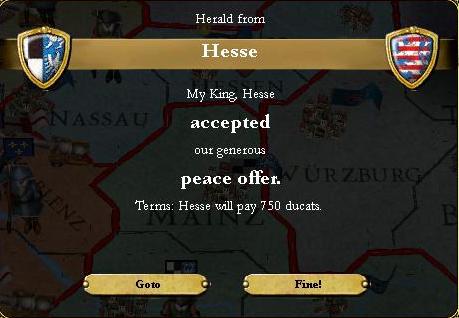
Bolstered by mercenary troops, the Swabians counter-attack in March.
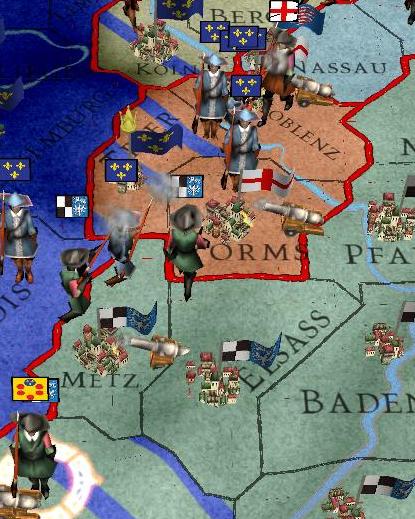
The French are defeated in Trier and Cologne, and Alsace is retaken.
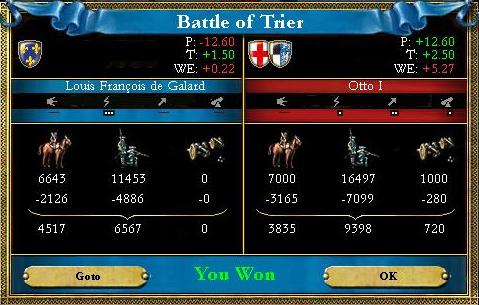
By September, the situation has stabilized somewhat, with most French troops pushed back into France. Unfortunately, the fighting has drained Swabia's manpower, and Friedrich lacks the means to sustain any kind offensive, preferring instead to deploy his armies defensively along the border and let the Frenchmen come to him. Great Britain has shown itself completely passive throughout the war, not even sending out its fleet to blockade the French coast, despite personal pleads from Friedrich to King Henry.
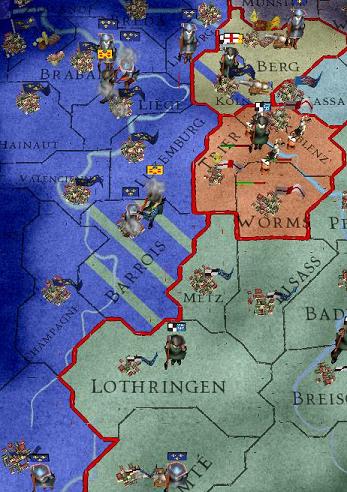
Several French attacks are launched across the border, but are driven back by overwhelming Swabian numbers.
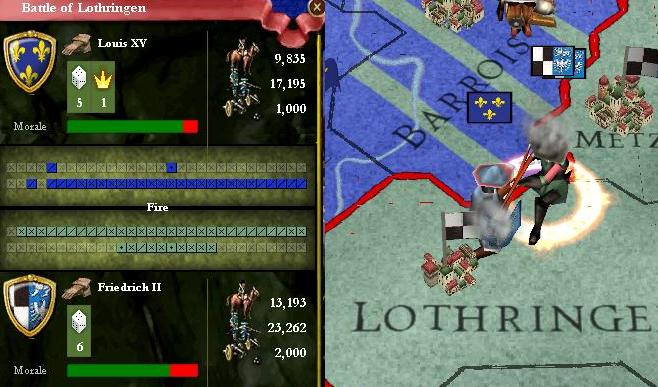
A major French offensive in July of 1592 succeeds in routing the 2nd army and retaking Cologne and Trier.
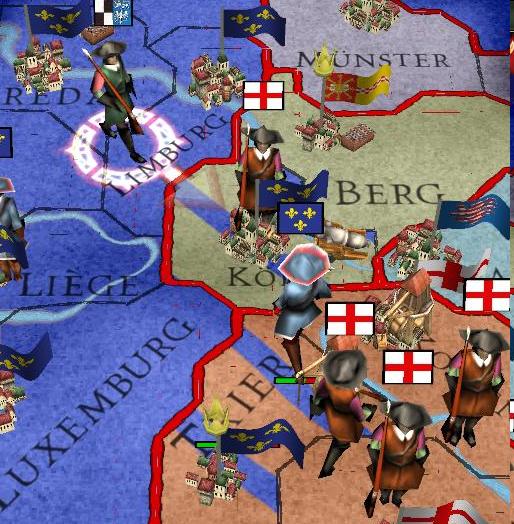
Swabian reinforcements are sent up from Alsace, and the attack is beaten back. The French army is pursued into Luxemburg, where it is wiped out - twenty French regiments lost in a single blow.
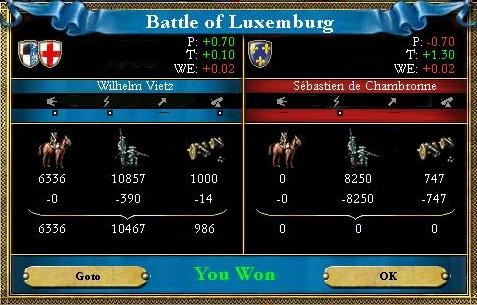
This is enough to convince Henri II to to agree to peace - after some negotiation, Henri agrees to rescind his claims on Franche-Comté and pay a small sum in reparations. It is estimated that some 75,000 Swabians and 90,000 Frenchmen died for what is essentially a return to status quo. The peace agreement is signed in in March of 1594.

Six quiet years follow, as both sides rebuild and quell the inevitable risings following in the wake of the war. Administrative reform and expansion continues with the establishment of Royal Constables to oversee tax collection, significantly increasing tax revenue in exchange for some additional unrest.

After three wars in the span of two decades, Swabia finally stops to catch its breath.